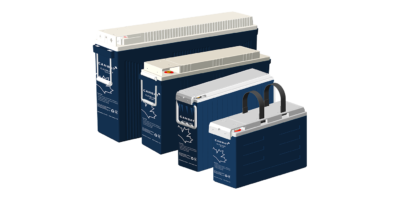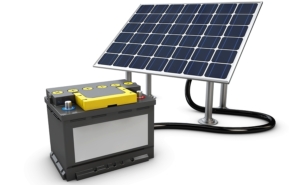A home battery system stores excess solar energy for use later on. The solar battery expands the utilization of the PV-system’s produced power and would offer free, sustainable power even if the sun isn’t shining and also the panels don’t generate energy.
Thus, using a solar battery, virtually no electrical power is fed to the grid while also preventing from purchasing costly electricity coming from the grid later. Simply because of the increased self-consumption, the electricity charges reduce considerably. You’ll pay much less per used kWh.
How is solar energy stored in batteries?
 Solar batteries function by storing power generated by your solar panels for use later. In some instances, solar batteries have got their own inverter and provide integrated energy conversion. The larger your battery’s capacity, the greater solar energy it could store.
Solar batteries function by storing power generated by your solar panels for use later. In some instances, solar batteries have got their own inverter and provide integrated energy conversion. The larger your battery’s capacity, the greater solar energy it could store.
Whenever you install a solar battery within your solar panel system, you’ll be able to store extra solar electricity at your house rather than giving it back to the power grid. In case your solar panels are generating much more electricity compared to what you need, the extra energy will go towards charging the battery. Later on, whenever your solar panels aren’t generating electrical energy, you could draw down the power you stored previously on your battery for evening use. You’ll simply give electricity back to the power grid once your battery has been fully charged, and you’ll simply draw electricity coming from the grid once your battery runs out.
What this implies in practical terms is that houses having solar-plus-storage could store extra solar power onsite to be used later whenever the sun isn’t shining. For a bonus, given that solar batteries store energy at your house ., they also provide short-term back-up power in case there’s a electrical power interruption in your place.
Types of Solar Battery
You can find 4 main types of battery utilized in connection with storing electrical power coming from solar power systems. Listed below is an overview of the several technologies presently available and other information on each type.
1) Lead acid
Unexciting perhaps. Unappealing and bulky certainly. However also reliable, proven and tested. Lead acid batteries have already been taking the world off-grid for many years. However they’re quickly being surpassed by some other technologies having longer warranties and cheaper costs as solar battery storage gets to become more popular.
 2) Lithium-ion
2) Lithium-ion
Lithium-ion (Li-ion) batteries are changing in progress as the electric powered car industry powers their development. Headed by the superbly marketed Tesla Powerwall, lithium-ion batteries are aiming to become the most favored option for on-grid solar battery storage for the near future.
3) Flow
Flow batteries really are a fairly new entrant into the battery storage industry (although their technology has been in existence for several years). They are known as flow batteries simply because they have a water based solution of zinc-bromide sloshing within them. Right now just a few companies are creating flow batteries for the residential industry.
4) Sodium Nickel Chloride
Sodium nickel chloride technology is another rival to the prominent lithium-ion storage technology. It provides a variety of environmental and safety advantages because of its unique battery chemistry.
What are the advantages of a solar battery system?
Photovoltaic systems with no storage option generate electricity to use instantly. This really is seldom effective, considering that solar energy is primarily produced in the daytime, when the power necessity of many homes is low. Then again, electrical power demand raises considerably during the night. Using a battery system the extra solar power generated in the daytime could be utilized when it’s actually needed. Without needing to alter your habits, you:
- permanently decrease your electrical power bills
- directly play a role in a sustainable future
- optimize the self-consumption of your PV system’s electrical energy
claim your independence coming from big energy providers


